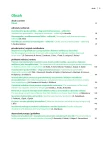-
Medical journals
- Career
Insulin analogues of patients with diabetes and renal impairment
Authors: Alena Adamíková
Authors‘ workplace: Diabetologické centrum Interní kliniky Krajské nemocnice T. Bati, a. s., Zlín, přednosta prim. MUDr. Jiří Latta
Published in: Vnitř Lék 2015; 61(2): 147-150
Category: Review
Overview
The main cause of renal failure is diabetic nephropathy which affects 20–40 % of diabetic patients. Diabetics with altered renal function have restricted therapeutic options due to the risk of accumulation of oral antidiabetic drugs and of their metabolites at a reduced glomerular filtration rate. Good metabolic control is very important during the early phases of nephropathy for reducing the risk of progression and in the stage of renal failure reduces the risk of progression of atherosclerosis and improves life prognosis. Metabolism of insulin is changed during renal failure, clearance of insulin is prolonged, the risk of hypoglycemia increases. Short-acting insulin analogues have faster absorption and long-acting analogues have a lower risk of hypoglycemia. Thus they can positively affect glycemic control of patients with diabetes and impaired renal function.
Key words:
diabetic nephropathy – insulin analogues – renal impairment
Sources
1. Morioka T, Emoto M, Tabata T et al. Glycemic control is a predictor for survival of diabetic patients on hemodialysis. Am J Kidney Dis 2001; 24(5): 909–913.
2. Oomichi T, Emoto M, Tabata T et al. Impact of glycemic control is a predator for survival of diabetic patients on chronic regular hemodialysis: a 7-year observational study. Diabetes Care 2006; 29(7):1496–1500.
3. Charpentier G, Riveline JP, Varroud-Vial M Management of drugs affecting blood glucose in diabetic patients with renal failure. Diabetes Metab 2000; 26(Suppl 4): 73–85.
4. Biesenbach G, Bodlaj G, Ebner S et al. Metabolic control and vascular diseases under oral antidiabetic drug versus insulin therapy and/or alone during the first year of hemodialysis in type 2 diabetic patients with ESRD. Int Urol Nephrol 2011; 43(4):1155–1160.
5. deBoer IH et al. DCCT/EDIC Research Group. Kidney disease and related findings in the diabetes control and complications trial/epidemiology of diabetes interventions and complications study. Diabetes Care 2014; 37(1): 24–30.
6. Eliasson B, Eeg-Olofsson K, Cederholm J et al. Antihyperglycaemic treatment of type 2 diabetes: results from a national diabetes register. Diabetes Metab 2007; 33(4): 269–276.
7. Wutte A, Plank J, Bodenlenz M et al. Proportional dose-response relationship and lower within-patient variability of insulin detemir and NPH insulin in subjects with type 1 diabetes mellitus. Exp Clin Endocrinol Diabetes 2007, 115(7): 461–467.
8. Levemir 100 U/ml (Flexpen). SPC. Dostupné z WWW: <http://www.ema.europa.eu/docs/cs_CZ/document_library/EPAR_-_Product_Information/human/000528/WC500036662.pdf> nebo <http://www.sukl.cz>.
9. Niafar M, Nakhjavani M, Esteghamati A et al. Efficacy and Safety of Insulin Glargine in Type 2 Diabetic Patients with Renal Failure. J Diabetes Metab 2012; 3(4): 1–4.
10. Action to Control Cardiovascular Risk in Diabetes Study Group. Gerstein HC, Miller ME, Byington RP et al. Effects of intensive glucose lowering in type 2 diabetes. N Engl J Med 2008; 358(24): 2545–2559.
11. Shurraw S, Hemmelgarn B, Lin M et al. Association between glycemic control and averse outcomes in people with diabetes mellitus and chronic kidney disease: a population-based cohort study. Arch Intern Med 2011; 171(21): 1920–1927.
12. Képénékian L, Smagala A, Meyer L et al. Continuous glucose monitoring in hemodialyzed patients with type 2 diabetes: a multicenter pilot study. Clin Nephrol 2014; 82(4):240–246. Dostupné z DOI: <http://dx.doi.org/10.5414/CN108280>.
13. Haahr H, Heise T. A review of the pharmacological properties of insulin degludec and their clinical relevance. Clin Pharmacokinet 2014; 53(9): 787–800.
14. Kiss I, Arold G, Roepstorff C et al. Insulin degludec: pharmacokinetics in patients with renal impairment. Clin Pharmacokinet 2014; 53(2): 175–183.
Labels
Diabetology Endocrinology Internal medicine
Article was published inInternal Medicine

2015 Issue 2-
All articles in this issue
- Has the pregnancy outcome of women with pregestational diabetes mellitus improved in ten years?
- The importance of transcutaneous oxygen tension monitoring in diabetic patient with complications
- Autoimmune pancreatitis – diagnostic consensus
- Interstitial lung diseases and granulomatoses associated common variable immunodeficiency.
- The examination of the small intestine by magnetic resonance imaging
- The new drug is much more effective than ACE inhibitors in chronic heart failure
- Spontaneous bacterial peritonitis
- What are biosimilars and what do they bring to us?
- Empagliflozin – the new representative of SGLT2 transporter inhibitors for the treatment of patients with diabetes 2 type
- Autoimmune pancreatitis – diagnostic consensus – editorial
- Acromegaly and pharmacotherapy – editorial
- Has the pregnancy outcome of women with pregestational diabetes mellitus improved in ten years?
- Insulin analogues of patients with diabetes and renal impairment
- Present and future in the management of venous vascular diseases
- Akromegaly and pharmacotherapy
- A rare case of multiple myeloma: multiple solitary plasmacytomas of distal extremities
- Calcific uremic arteriolopathy – treatment with sodium thiosulfate
- Internal Medicine
- Journal archive
- Current issue
- Online only
- About the journal
Most read in this issue- Spontaneous bacterial peritonitis
- The examination of the small intestine by magnetic resonance imaging
- Empagliflozin – the new representative of SGLT2 transporter inhibitors for the treatment of patients with diabetes 2 type
- The importance of transcutaneous oxygen tension monitoring in diabetic patient with complications
Login#ADS_BOTTOM_SCRIPTS#Forgotten passwordEnter the email address that you registered with. We will send you instructions on how to set a new password.
- Career

